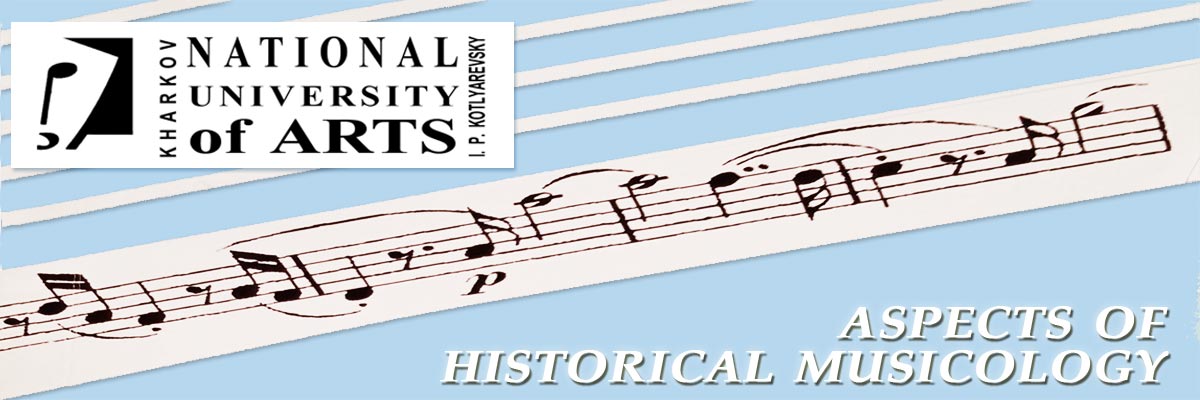Editorial staff
Editor in Chief
Chernyavska Marianna – PhD in Art Studies, Full Professor, Vice-rector for research of the Kharkiv I. P. Kotlyarevsky National University of Arts, Kharkiv, Ukraine,
Scopus,
Web of Science Researcher ID,
 https://orcid.org/0000-0002-8379-5536 https://orcid.org/0000-0002-8379-5536
Editorial board
Adamoniene Ruta – Doctor of Philosophy, Professor, Mykolas Romeris University, Vilnius, Lithuania,
Scopus,
Web of Science Researcher ID,
 https://orcid.org/0000-0003-4025-2213 https://orcid.org/0000-0003-4025-2213
Govorukhina Nataliya – Ph.D. in musicology, Professor, Rector of Kharkiv I.P.Kotlyarevsky National University of Arts, Honored Art Worker of Ukraine, Kharkiv, Ukraine,
Web of Science Researcher ID,
 https://orcid.org/0000-0003-3100-9035 https://orcid.org/0000-0003-3100-9035
Hromchenko Valeriy – Dr. habil. in Art Studies, Associate Professor, Vice-Rector for Research of the Dnipro M. Glinka Academy of Music, Dnipro, Ukraine,
 https://orcid.org/0000-0002-2446-2192 https://orcid.org/0000-0002-2446-2192
Kablova Tetiana – PhD, Associate Professor, Scientific Secretary of the Rectorate of the Kyiv Municipal Academy of Pop and Circus Arts, Kyiv, Ukraine,
Web of Science Researcher ID,
 https://orcid.org/0000-0002-0954-8422 https://orcid.org/0000-0002-0954-8422
Kopeliuk Oleh – PhD in Art Studies, Associate Professor, Vice-rector for scientific and pedagogical work and international relations of the Kharkiv I. P. Kotlyarevsky National University of Arts, Kharkiv, Ukraine,
Scopus,
Web of Science Researcher ID,
 https://orcid.org/0000-0002-0428-1538 https://orcid.org/0000-0002-0428-1538
Nikolaievska Yuliia – Dr. habil. in Art Studies, Full Professor, Department of Interpretology and Music Analysis, vice-rector for scientific, pedagogical, creative work and innovation activities of the Kharkiv I. P. Kotlyarevsky National University of Arts, Kharkiv, Ukraine,
Scopus,
Web of Science Researcher ID,
 https://orcid.org/0000-0002-7256-4214 https://orcid.org/0000-0002-7256-4214
Petrovic Milena – PhD, Professor, Department of Solfeggio and Music Education, Faculty of Music, University of Arts, Belgrade, Serbia,
Scopus,
Web of Science Researcher ID,
 https://orcid.org/0000-0002-7652-4690 https://orcid.org/0000-0002-7652-4690
Rakochi Vadim – Dr. habil. in Art Studies, Senior Lecturer, Department of Instrumental Performance, Municipal Institution of Higher Education, Kyiv Regional Council, “Pavlo Chubynsky Academy of Arts”, Kyiv, Ukraine,
Scopus,
Web of Science Researcher ID,
 https://orcid.org/0000-0003-4025-2213 https://orcid.org/0000-0003-4025-2213
Roshchenko Olena – Dr. habil. in Art Studies, Full Professor, Department of Ukrainian and Foreign Music, the Kharkiv I. P. Kotlyarevsky National University of Arts, Kharkiv, Ukraine,
Scopus,
 https://orcid.org/0000-0002-6048-6335 https://orcid.org/0000-0002-6048-6335
Sandu-Dediu Valentina – Doctor in Musicology, Professor of Musicology, National University of Music Bucharest, Rector of New Eeurope College, Institute for Advanced Study, Bucharest, Romania,
Scopus,
 https://orcid.org/0000-0002-5982-8983 https://orcid.org/0000-0002-5982-8983
Savchenko Hanna – PhD in Art Studies, Professor, Head of the Department of Composition and Orchestration, the Kharkiv National I.P. Kotlyarevsky University of Arts, Kharkiv, Ukraine,
Scopus,
Web of Science Researcher ID,
 https://orcid.org/0000-0002-5982-8983 https://orcid.org/0000-0002-5982-8983
Schöning Kateryna – PhD, Head of scientific projects (PostDoc, Senior), University Lecturer (historical Musicology), Institute of Musicology, University Vienna, Vienna, Austria,
Scopus,
 https://orcid.org/0000-0003-1270-4294 https://orcid.org/0000-0003-1270-4294
Shapovalova Liudmyla – Doctor of Arts, Professor, Head of the Department of Interpretology and Analysis of Music, Kharkiv National I.P. Kotlyarevsky University of Arts, Kharkiv, Ukraine,
Web of Science Researcher ID,
 https://orcid.org/0000-0002-9407-7337 https://orcid.org/0000-0002-9407-7337
Weiss Jernej – PhD, Professor, Department of musicology, Faculty of Arts, University of Ljubljana, Ljubljana, Slovenia,
Scopus,
Akademija za glasbo
The editorial board of the collection of research papers "Aspects of Historical Musicology" in its work is guided by the requirements of Ukrainian legislation in the field of copyright and ethical principles, which are followed by leading publishers of scientific periodicals. The relationship between all participants in the process of preparation of the journal is based on the principles of objectivity and friendliness. Manuscripts are evaluated solely on the basis of scientific quality, regardless of the author's citizenship or political views, ethnicity, race, gender, sexual orientation, or religious beliefs.
Prevention of plagiarism
The editorial board of the collection of research papers "Aspects of Historical Musicology" supports ethical principles of international scientific periodicals and subordinates its activities to the Code of Ethics for Scientific Publications. The technical editor checks the submission for plagiarism using Unicheck.com. This system calculates the proportion of borrowed text by the following indicator: the percentage of the text that determines the level of borrowings found in certain sources, which consist of fragments of text containing at least 8 words in a row.
If according to the results of checking the plagiarism is more than 5%, the article is rejected.
Varieties of plagiarism are:
- copying and publishing the work performed by another author as one’s own;
- literal copying of fragments of the text (from a phrase to a set of sentences) of someone’s work without proper citation;
- copying text and making some minor changes (reformulating sentences, changing the word order, etc.) without proper citation;
- excessive use of paraphrases. Paraphrase means retelling other people's thoughts, ideas or a text with own words; the essence of paraphrase is to replace words (signs), idioms or sentences when using any author's scientific work (stored on electronic or paper media, including the one posted on the Internet).
Authors are responsible for getting a copyright permission to reproduce illustrations, tables, drawings taken from other authors and / or sources. The permission must be placed at the bottom under each element.
Ethical principles for the editorial board
- it guarantees the quality of materials approved for publication;
- it helps to correct errors and rejects material that requires significant refinement;
- it responds to a situation of conflict of interests;
- it ensures the confidentiality of author's manuscripts;
- it maintains the anonymity of reviewers
Ethical principles for reviewers
- the reviewed manuscript is confidential information;
- criticism of the results of scientific research should be objective;
- the editorial board is notified of a conflict of interest;
- unpublished data obtained from submitted manuscripts cannot be used for personal purposes.
|

